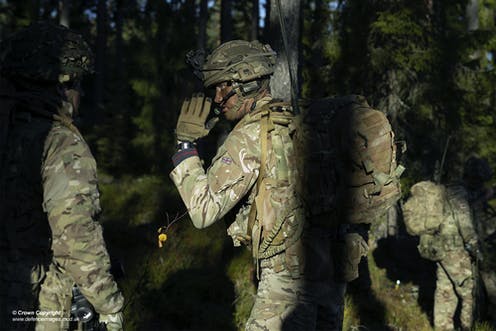Defence Images/Ed Lowe, CC BY-NC-ND
The Westminster parliament is currently considering one of the most ill-conceived and misleadingly presented pieces of legislation ever introduced. It purports to do something that it cannot while doing several things it should not.
The legislation in question is the Overseas Operations Bill, introduced by Johnny Mercer, minister for defence people and veterans. This bill is intended to protect members of the armed forces from what the government believes to be vexatious legal action. However, it also severely limits the ability of members of the armed forces to hold the government to account when it fails to provide adequate equipment or fails to protect them while they are serving.
New rules would prohibit people from suing for negligence more than six years after an incident or six years after gaining knowledge about, for example, a medical condition. The bill also seeks to ban claims under the Human Rights Act more than six years after a particular event, or just 12 months after gaining knowledge about the event. Most importantly the bill makes no exception for claims by members of the armed forces themselves. This would drastically limit the options for bereaved families such as those who complained about the fatally inappropriate deployment of lightly armoured “Snatch” Land Rovers in very hostile settings.
It is presented as an attempt to shield, “military personnel and veterans from vexatious claims” pursued by dodgy lawyers. But this is nonsense, because such claims – vexatious or otherwise – are not brought against individual soldiers: they are brought against the Ministry of Defence or relevant secretary of state. And it is abundantly clear that while British armed forces operate to the highest legal standards, there have in fact been some bad apples, so not all claims are “vexatious”.
Misleading claims
In July, Mercer failed to dispel concerns about the bill’s impact on claims by the armed forces in answer to an urgent question in the House of Commons. Mercer said that “the issue around limitation is, I am afraid, misunderstood, because it is not from the point of when the injury happened or the incident that caused the injury; it is from the point of awareness or the point of diagnosis”.
There are two major problems with this statement which mean Mercer, a veteran himself, may well have unwittingly misled parliament. First, on a close reading of the bill that statement is only correct in relation to claims for negligence: there is a much shorter time limit for human rights claims, as noted above (the question was specifically about “civil liability”, meaning negligence, but Mercer’s answer addressed both types of legal action). The two types of legal action have different conditions for “winning”, so it would be possible for one claim to succeed and the other to fail. That is why it is so important that both are available.
Second, we know that there are very good reasons why people may take longer than six years to come forward after an incident. That’s particularly true if it means speaking out against superiors or employers, for example in relation to harassment. These are legislative changes that should not be made.
In a further sleight of hand, the bill purports to discourage judges from allowing members of the armed forces to be prosecuted under criminal law for historical offences more than five years after they are alleged to have taken place. It would also require the attorney general to consent to a prosecution. These measures really are about legal action against individual members of the armed forces.
But note that, unlike with the claims against the MoD, this is not an absolute time limit (a “statute of limitations”). Instead, the bill merely states that the prosecution of historical offences should be “exceptional” and gives judges a list of factors that they must consider. The bill cannot provide an absolute time limit for prosecutions or it would breach our international legal obligations to prosecute genocide, torture, and war crimes. In fact, even the bill as it currently stands is legally debatable in international law and has been accused of harming our international standing.
It is to be hoped that this lamentable bill will be stopped in its tracks before it undermines the legal position of members of the armed forces.
![]()
James Sweeney does not work for, consult, own shares in or receive funding from any company or organisation that would benefit from this article, and has disclosed no relevant affiliations beyond their academic appointment.











